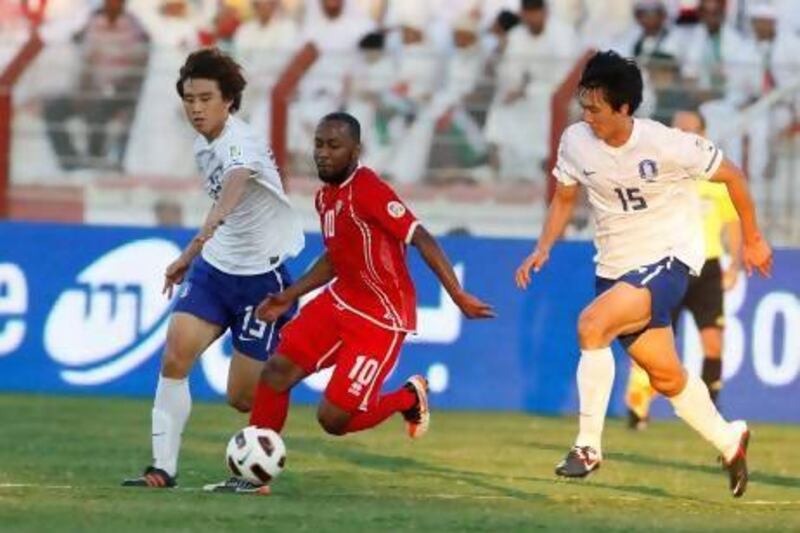Kuwait at Spain, 1982.
Iraq at Mexico, 1986.
The UAE at Italy, 1990.
In 1994, 1998, 2002 and 2006, it was Saudi Arabia.
For 24 years, you could count on at least one of the Arabian Gulf nations representing the region at the World Cup.
That sequence was broken in 2010, and sadly, it is not looking too good for next year's World Cup in Brazil, either. In fact, the next Gulf presence we can look forward to with any confidence could be Qatar 2022, when the hosts qualify automatically.
The Gulf's three remaining hopes can still mathematically qualify for 2014, but their positions could hardly be more precarious as they go into the latest round of matches.
It is Qatar's continued struggles that perhaps epitomise the region's general malaise.
Fourth in Group A, they take on Iran - who have also failed to make it past the first round at a World Cup, their last participation in being in 2006 - in Doha tonight in their latest "must-win" match.
Meanwhile, Oman and Iraq, who face each other in Muscat, are fourth (six points) and fifth (five points), respectively, in Group B. With Japan running away with things at the top of the group, the remaining four teams are split by two points, with Jordan in second place, only a point ahead of Australia and Oman.
However, Iraq and Oman's remaining schedules make them outsiders to qualify, especially as each team has won just once so far.
There is still the chance of a Gulf team finishing in third place in either group, which will result in a play-off, with the winner then facing the fifth best South American team over two legs.
That will likely be a country such as Chile and Uruguay, leaving whichever Asian team makes the match as heavy underdogs.
The situation is less must-win than it is mustn't lose. Defeat would likely spell the end of things for Qatar, Oman or Iraq.
That Gulf struggles are down to a drop in standards is beyond debate. Only the UAE, Gulf Cup winners in January, can claim any improvement over the last two years, but unfortunately, this came too late for a qualifying campaign that was over almost before it began.
A second successive World Cup without Gulf participation is looking likelier with each passing match day.
With exception of Saudi Arabia's impressive run, previous qualifications appear to have been a series of one-off successes, rather than indications of periods of sustained progress.
All teams regressed in the aftermath of their World Cup debuts. And, after reaching the second round in 1994, the Saudis performed dismally at the 1998, 2002 and 2006 World Cups.
In 2002, they lost all their games, failed to score and were thrashed 8-0 by Germany.
In 1998 and 2006, they at least managed a point and some goals by drawing 2-2 with South Africa ('98) and Tunisia ('06), but still finished at the bottom of their group on both occasions. They only scored in two of nine matches across three competitions.
With Saudi Arabia, Kuwait and UAE exiting before this year's final group stages, most eyes turned to Qatar, a team whose time was meant to have finally arrived. Things haven't exactly gone their way.
A defeat against Iran and the hosts of the 2022 World Cup will likely be left facing a long wait before the 2018 campaign provides them a final opportunity to avoid becoming the only nation to host a World Cup having never before played in one.
It is not hard to pinpoint where the blame is for this slump. Football associations across the Gulf are plagued by institutionalised mismanagement, with mistakes being made at every level.
The same self-defeating policies have been repeated over and over. Short-termism, knee-jerk reactions to defeats and obsession with hiring foreign coaches have had dire consequences on stability and progress.
In that respect, the UAE's decision to put faith in Mahdi Ali has been isolated and inspired. It reaped dividends with Gulf Cup glory, and it is tempting to speculate just how different the UAE's qualifying campaign for Brazil 2014 would have gone under his calming leadership.
The quality of the region's footballers has also fallen.
Technically, teams such as Iraq, Kuwait and Saudi Arabia in particular are nowhere near the standards set by their predecessors. Fewer individual talents are making the grade, too.
At the recent Gulf Cup, a creative player like Al Ain's Omar Abdulrahman stood out because there were few like him.
Teams often play not to lose, and yet do so, anyway. The 17 matches played by Qatar, Oman and Iraq in the World Cup final group stage qualifiers have reaped a total of seven losses, six draws and a pitiful four wins between them.
Physical strength and fitness levels, meanwhile, continue to lag behind international standards, as evident by many sides' inability to hold onto leads or close games out. Time-wasting and play-acting, on the other hand, are increasingly prevalent, especially in the later stages of matches.
Oman, Bahrain and Yemen are, due to meagre resources, excused to a certain degree. Qatar and Saudi Arabia are not.
Qatar, for one, has tried to address the shortage of local quality by nationalising foreigners, often from Brazil. This quick-fix policy has not worked so far. Their last final appearance in any competition was when they won the 2004 Gulf Cup.
Meanwhile, we await the future stars of 2018 and 2022 to emerge from Aspire Academy, the country's centre of excellence.
Such over-ambition can have negative consequences. Sporting academies and major events are valuable only as vehicles for improving performances, and are not an end in themselves.
Qatar should learn to be Qatar before they aim to be Brazil. Otherwise, even that guaranteed spot at the 2022 World Cup will lead to nothing.
Just ask their neighbours.
Follow us
[ @SprtNationalUAE ]





